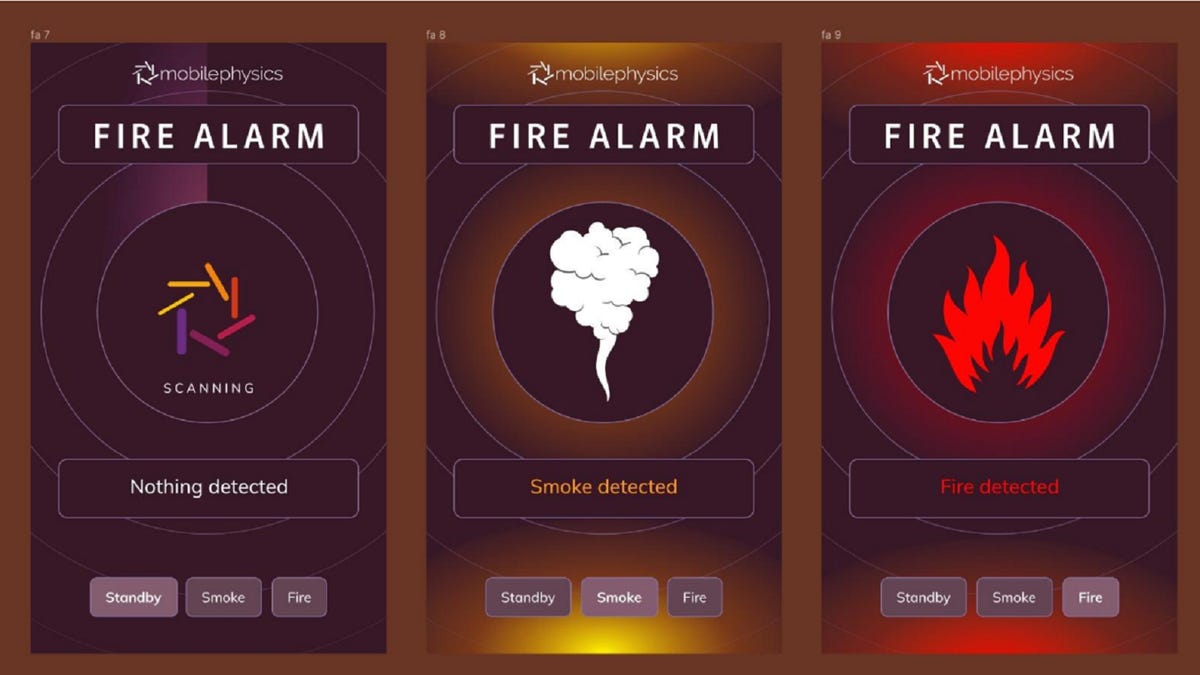Can Your Smartphone Test Air Quality? This Startup Thinks So
Next year's leading Android phones will be able to measure smoke, temperature, UV exposure and more, this startup says.

A view of MobilePhysics' technology and app warning people about fire and smoke detected by their phone.
Top smartphones can take amazing photos these days, but that's not all their high-powered cameras can do. A startup has repurposed the suite of sensors in leading Android smartphones to measure air quality, smoke levels, and more, giving users an idea of how safe their surroundings are.
A startup called MobilePhysics on Tuesday announced its new air-monitoring technology called -- note the space -- Mobile Physics, which is supported by the Snapdragon 8 Gen 3 chipset that Qualcomm announced earlier this year. Phone-makers can opt to implement Mobile Physics tech, and if so, make it available in an app preinstalled on phones.
Read more: Best Phone of 2023
The MobilePhysics company is focused on bringing this functionality to as many people as it can, chairman and Nobel Prize winner Roger Kornberg told CNET over email. Its technology can measure so-called PM2.5 pollutant particles (smaller than 2.5 microns across) passively when you use the phone, which could be helpful to most people on the planet -- 99% of the world's population breathes air exceeding the World Health Organization's standards, Kornberg said.
"More people die from this exposure to PM2.5 than from any other cause of death including cancer, COPD, heart disease, you name it," Kornberg said. "It affects every human cell, tissue and organ in ways we don't yet understand."
Much like how Apple has used Apple Watch sensors to measure new health metrics like blood oxygen, Mobile Physics uses smartphone sensors and cameras to determine ambient environmental factors including air quality, smoke levels, ultraviolet exposure, temperature and others -- even while the phone is in a pocket.
Mobile Physics does these scans in the background while people check emails or otherwise have their phone out of their pockets. The app will notify users when their surroundings turn hazardous, from nudging to get under cover after staying in the sun too long to telling them to open a window or turn on an air purifier to improve air quality, according to a press release. The smoke monitor can be set to run overnight to scan for danger while people sleep. Ultimately, this is another way for phones to watch out for owners.
While no phones have been confirmed to come preinstalled with Mobile Physics, the company has tested it on the Google Pixel 8 and Xiaomi 11 Ultra, both of which have the basic sensors and specific VL53L8 time-of-flight sensor from STmicroelectronic that are required to run the air-scanning technology.
The Snapdragon 8 Gen 3 launched in October with much fanfare for its on-device generative AI capabilities, and while Mobile Physics doesn't expressly harness that capability, better edge AI implementations could reduce the time needed to take measurements. And as phones add more sensors and cameras, so too does Mobile Physics' toolbox grow the parameters it can measure and improve the accuracy of its findings, Kornberg said.
Read more: Best Air Purifier of 2023
That's crucial, as the world isn't taking the dangers of poor air quality seriously enough. And it's not just in visibly polluted areas but everywhere we live, Kornberg stressed: whether frying a steak, cleaning the floors, standing next to a bus, we're being exposed to pollutants. One day when we look back at our lack of control of air quality, we'll be just as ashamed at our failures as we are at governments who failed to protect people from the known dangers of cigarettes, he said.
"We are already there with air quality, we just don't all fully grasp how serious the situation is," Kornberg said. "MobilePhysics is the first step, a big step, towards solving this problem."
Correction, Dec. 20: This story initially misstated how the Mobile Physics technology will be implemented in phones. It will be supported by the Snapdragon 8 Gen 3 chip and phone-makers can choose to integrate Mobile Physics on their phones, which will be usable via a preinstalled app.

